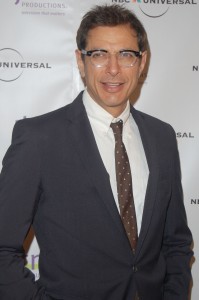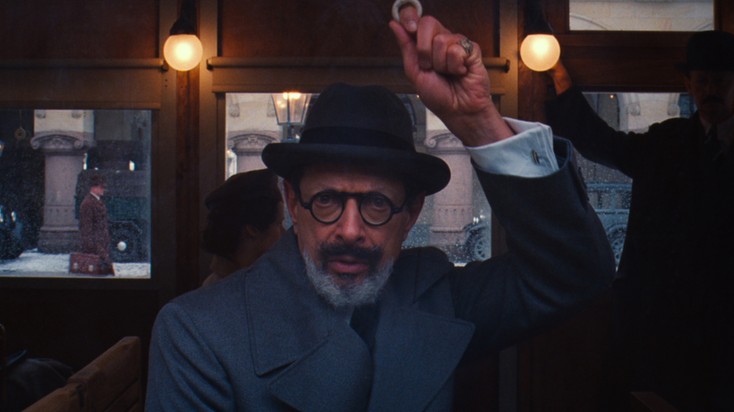
Jeff Goldblum at the Beverly Wilshire Hotel in Beverly Hills CA. Christian_Rosas_Pacific Rim Photo Press.
By ANGELA DAWSON
Front Row Features
HOLLYWOOD—In Wes Anderson’s playfully whimsical caper “The Grand Budapest Hotel,” Jeff Goldblum plays deputy Vilmos Kovacs, a family attorney with a Sigmund Freud-type beard and mustache. That is fitting because like the famed psychologist’s theories, much of happens in this otherwise simple crime caper has more symbolic aspects hidden beneath the surface.
Goldblum, who previously worked with Anderson on “The Life Aquatic with Steve Zissou,” highlighted some of the cultural and political elements at work in the film, during a recent press day.
As Kovacs, he plays the attorney to a wealthy matron (played by a heavily made up Tilda Swinton), whose sudden passing sets in motion a scramble to lay claim to her vast fortune. Leading the charge is her son, Dmitri (“The Pianist’s” Adrien Brody), the film’s ruthless and darkly comic main villain. When Goldblum’s character reads the will, revealing the bequeathment of a priceless painting to Gustave H. (Ralph Fiennes), the concierge of The Grand Budapest Hotel,” Dmitri sets his thug-like henchman, Jopling (Willem Dafoe), to eliminate him.
The tall, lanky actor, best known to audiences for his starring roles in “The Fly,” “Jurassic Park” and “Independent Day,” speaks with a certain musicality mixed with mystery in his voice that makes it obvious why the auteur filmmaker cast him again in a film.
Q: How would you describe this film?
Goldblum: I’d call it specific, which is one of the most important words in the theatrical dictionary. It’s kind of what you want: “Well, what exactly do you want here as an actor and as a storyteller?” So it’s the most delicious and one of the most important ingredients, which is what I think makes him an effective storyteller.
Q: How do you describe Wes Anderson?
Goldblum: I see him as one of the most brilliant, important and serious filmmakers. He’s was a brilliant young voice from the start, who found his particular voice, and has only evolved and developed it further. Now, he’s at the height of his form. It’s esthetically clear, specific and particular. So what it’s like is great. I find it creatively inflaming and inspiring to jump on and have some things done. First of all, to be part of something that works as a whole, and, for my taste, beautiful, but there’s another part of it. It’s harder to describe, exactly, but in spirit, he’s free-spirited. I think Robert Altman was a fellow (Anderson) admired, and he trusts and loves actors. And because of his whimsical theatrical ways, he has an esthetic, that he wants the characters to be filled with actorly acting, which is honest and naturalistic and truthful and deep and real. So there’s all that. You don’t feel like you’re being puppeted around at all. You just have this platform to go, “Hey, this a great way to make myself up as never before, and a great thing to do, and let me see what I can bring to it, and there’s plenty to kind of fill in. Like, with my character, there are things under the surface, of crossroads heroism and conscience and all that.
Q: Was there a difference between him directing you in this versus “The Life Aquatic?”
Goldblum: Not essentially. But there were many elements that were similar. Since “The Fantastic Mr. Fox,” there’s a couple of things he’s gotten in the tool box like some of the models you see in this movie that I think are a new variation of what he does. I find them very enjoyable and handcrafted. The animatic thing, where because of “The Fantastic Mr. Fox,” and the needs for puppets and all that stuff, he figured out all the shots completely before he started, and so when I rehearsed with him before the movie, he showed me a bit of it. And when I saw the finished (version), and I’ll bet on the DVD extras, you’ll see some of it, it’s a moving, animated storyboard. It had all the shots in the movie, pretty much, and the cuts and everything. And when there was dialogue, it was his voice voicing all the parts. That was a little different and I found it very fascinating and helpful too. You know, (famed actor and theater director) Stanislavski always gave people line readings. I like to know what my character is thinking about and then make it my own.
Q: It seems like you had fun with Wes’ dialogue in this movie.
Goldblum: Yeah. I like his wordsmithery. It’s unique, isn’t it? It’s very clever and distinctive and musical. I like music and I like the musicality of his movies and the text. And he’s very particular. I like to do both. I was trained in improvisation of a certain kind, so I’ve done fully improvised movies and hybrid movies, where you go “Do this, but say it in a different way.” And I’ve done that. But I also have done plays, like I just did. I’ve done several recently where it’s a whole different rulebook. You’ve got to say exactly what the playwright wrote. And many moviemakers that I admire like the Coen Brothers, whom I’ve never worked with, but I hear that they stay strictly on script, and it’s your job to make it seem like you’re improvising. I like that a lot. I find that not a tricky demand, but I like to solve that puzzle. I’m nothing if not conscientious. I learned the lines and worked on them.
Q: Is Wes that strict?
Goldblum: He’s strict. I remember when we rehearsed, we talked about a couple of ideas and I asked him, “Is that they way you want me to say that?” It was all beautifully done but I thought maybe we could tinker with one or two things. Then I went home and for the month after, I played with it some more, and I remember when I came back (to set) and read the will speech, I did the whole thing a couple of times, and he was going, “Uh huh. Uh huh.” And then he said, “OK, that’s good, but are you leaving out a ‘the?’” I’m not making this up. He said, “You’re leaving out a ‘the.’” I said, “I’m not doing that accidentally. I thought it sounded better without.” And he said, “Uh huh. Can you put it back in?” And I said, “OK. I sure will.” I liked that. I didn’t feel constrained. If he’s doing fine stitching, I like being part of the team. So did that. But I wouldn’t call it rigid. I’d call it … what do you call that?
Q: Were you familiar with the writings of Stefan Zweig (the author who inspired Anderson to write the script) before making this?
Goldblum: I was not, but I was happy to be turned on to them. I was interested in how his interests intersected there and what he was trying to do, not to mention the stack of movies (Anderson) had in the research room that he invited us to share. He had a bunch of old books on old hotels and the period and the location. The stacks of movies were those that inspired him, many of them, which I’d never seen before. I’d never seen “To Be or Not To Be,” or “Grand Hotel,” “The Shop Around the Corner,” “Mortal Storm,” and a (Ingmar) Bergman movie called “The Silence,” which is a surreal story set in an old hotel. We had DVD players in our rooms so I saw all of those.
Q: How do you feel about “Independence Day” and “Jurassic Park” being remade?
Goldblum: Who knows? I was happy to have a little dinner meeting with Dean Devlin and Roland Emmerich. I had a great time working with them. They think they have some good ideas about what may happen now. It sounded interesting to me. I don’t know and I don’t know who knows what audiences necessarily are going to like.
Q: Would you want them make something that was true to those earlier films or do a whole new reimagining?
Goldblum: I haven’t thought about what I’d do or wish they’d do. Let’s see. What do you want from a new chapter? I don’t know. It’s challenging. I’m not writing it. Not many (of today’s remakes) are interesting, are they? I liked “The Godfather, Part II.” (Chuckling.) We’ll see what happens.





